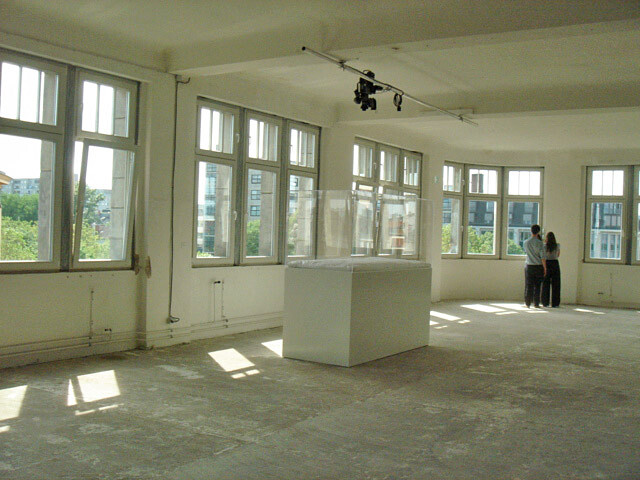Day 1: Wednesday, June 9th
Curated by Kathrin Rhomberg, the sixth edition of the Berlin Biennale seeks to examine the manner in which art negotiates “reality”—a loaded term, described rather abstractly in the curatorial statement—in a time of historical crisis and renegotiation that begins with the fall of communism and is marked, most recently, by September 11 and the collapse of financial capitalism. With works by forty-five artists from almost twenty countries (the vast majority from Western Europe and the U.S. but with a sizeable number from Eastern Europe), the exhibition is spread out among various venues, most of them in Kreuzberg, in a gesture surely welcomed by many, and consistent with the Berlin art world’s gradual move in the last few years from Mitte (now hopelessly gentrified) to other neighborhoods of the city.
Press accreditation took place in a courtyard lit by unseasonably strong early morning sunshine and was followed by a press conference in which Artistic Director of the German Federal Cultural Foundation Hortensia Völckers candidly discussed the difficulties of finding appropriate venues (the subject of much gossip and speculation in the months preceding the Biennale). Rhomberg expanded on her curatorial premise—abstractly again, although maybe it was the simultaneous translation that left me suspecting that I was hearing only a small portion of what was actually being said—before introducing Michael Fried who spoke about his participation as the curator of the Adolph Menzel exhibition at the Alte Nationalgalerie. Fried praised Menzel as one of the greatest, yet under-recognized, Realists of the 19th century whose work, like all great Realists (presumably including those contemporary artists featured in the Biennale) depicted “what it is like to be in the world, not what the world looks like.”
Upon conclusion of the presentations—a Q&A session was attempted but swiftly and ruthlessly halted by Biennale Director Gabriele Horn after some particularly bizarre and inane questions were raised—we were ushered out and directed to Oranienplatz 17, a formerly empty industrial building in central Kreuzberg and the Biennale’s main venue. Just as Rhomberg stated, the venue is a significant element in the exhibition—its rawness and architectural details complementing some works while imposing themselves upon others (mostly those that belong to the not-so-interesting category and are thus unable to compete with the beauty of the space). Divided between five floors, the exhibition includes a significant number of film and video works (not surprising in an exhibition dedicated to a renegotiation of Realism) projected in screening rooms built up with plain wooden walls, and interspersed among large open spaces that feature photographs, drawings, paintings and sculptures. All of the walls and floors have been left in their original state—unpainted and dirty—as if the exhibition design itself (created by artist Marcus Geiger) were a re-staging of the cycle of abandonment and re-appropriation that characterizes Berlin’s recent urban history and inevitably alludes to the neighborhood’s current gentrification. The overall effect is an exhibition that is formally austere and conceptually dense, but a negative consequence of this elegant precariousness is the sound spillover from multiple video works separated only by frail structures.
The best thing I saw today was, without a doubt, marxism today (prologue) (2010), by Phil Collins—a semi-documentary film that combines interviews with former GDR and USSR teachers of Marxist-Leninist philosophy with archival footage set to a melancholic soundtrack composed by Nick Powell and Stereolab’s Lætitia Sadier. As with previous works Collins deftly negotiates the slippery terrains of emotional and critical engagement and I would venture to say it is his strongest work to date. (A work in progress, a second part will be made later this year in which the teachers will travel to Manchester to teach Marxism in the high schools there). Also compelling, but eliciting more of a sense of voyeuristic complicity, than empathy is Ruti Sela & Maayan Amir’s Beyond Guilt #1 (2003), which records sexual encounters in public bathrooms of nightclubs in Tel Aviv, framed by persistent comments about war that crop up in the casual conversation between those being filmed. At times difficult to watch is Renzo Martens’ Episode 3 (2008) a film that documents the commodification of poverty while reflecting upon the conditions of its own making in a subtle critique of socially engaged art.
A final item worth mentioning from this preliminary tour was a sculptural/performance piece that I inadvertently witnessed from the second-floor landing as it took place in the courtyard below. A giant mammoth and stegosaurus (rescued by artist Hans Schabus from the former GDR Spreepark) lay on the ground while a group of both blind and blindfolded visitors carefully moved their hands over the texture of the animals’ polyester skin. Given the dozens of journalists peering down from their various perches on neighboring floors, it looked like a performance piece that strongly recalled Javier Téllez’s Letter on the Blind for the Use of Those Who See (2007), shown just last year at the Kunst-Werke. In reality it was a preparatory session of a satellite art education project—conceived especially for the Biennale by students from the Universität der Künste Berlin partly inspired by the Téllez piece —in which visitors will be lead through the exhibition and surrounding neighborhood by blind and visually impaired guides. It is a thoughtful educational program, more critical and inclusive than most, but one that created confusion on that particular day.







